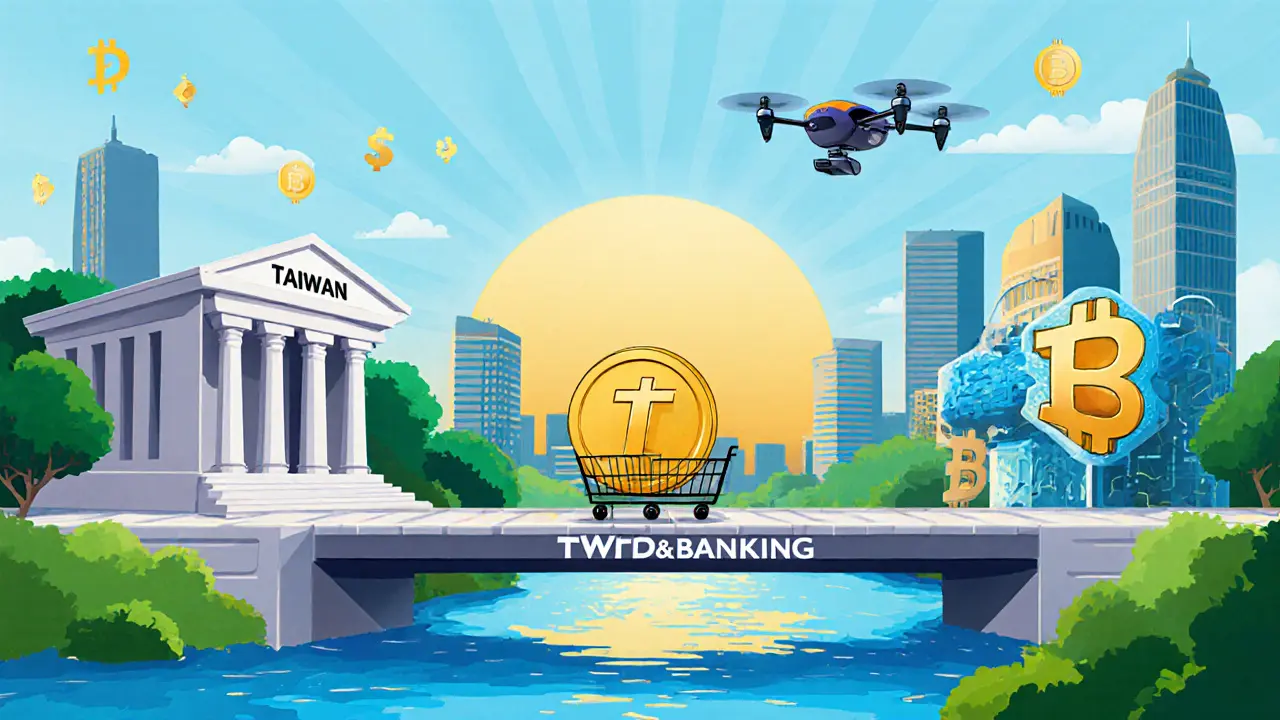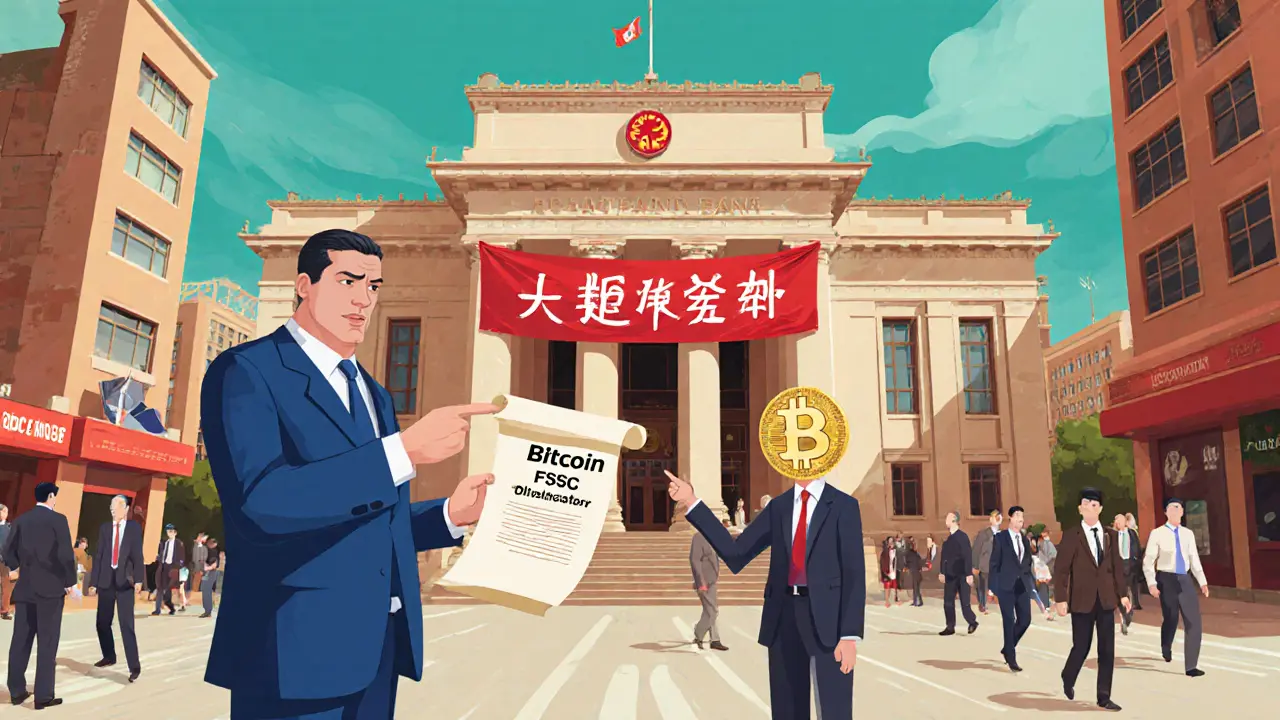Taiwan Crypto Regulation Timeline
2014
FSC directive bans local banks from accepting Bitcoin or offering fiat-crypto conversion services.
Banking RestrictionJuly 4, 2022
FSC expands the ban to credit-card acquirers, equating crypto purchases with prohibited online-gambling, stocks, futures, and options transactions.
Banking Restriction2024-2025
No change in the core prohibition, but the government begins drafting stablecoin legislation that could let banks handle government-backed digital tokens.
Stablecoin PolicyJanuary 1, 2025
All Virtual Asset Service Providers (VASPs) must register with the Financial Supervisory Commission (FSC).
VASP RegistrationJune 2025
FSC publishes draft legislation for stablecoins pegged to the New Taiwan Dollar (TWD).
Stablecoin PolicyCurrent Status Summary
Select a year and event type to see details about Taiwan's crypto regulations.
Taiwan has built a Taiwan crypto regulation system that lets people own and trade digital assets, but it draws a hard line at traditional banks. If you’re a trader, an exchange operator, or just curious about how crypto works in the island nation, this guide breaks down the rules, the why behind them, and what’s coming next.
Quick Takeaways
- Banks cannot handle Bitcoin or any crypto‑related services; they’re treated like banned online‑gambling transactions.
- All Virtual Asset Service Providers (VASPs) must register with the Financial Supervisory Commission (FSC) as of 1Jan2025.
- Non‑compliance can lead to fines up to NT$5million and up to two years in prison.
- MaiCoin is the biggest local exchange, moving about $70million daily, but it still lacks direct bank links.
- Stablecoins pegged to the New Taiwan Dollar will be regulated from June2025, opening a possible path for banks.
Regulatory Landscape: Who’s In Charge?
Financial Supervisory Commission (FSC) acts as Taiwan’s crypto overseer. It classifies Bitcoin as a “highly speculative virtual commodity” rather than a currency, a stance it first announced on 30Dec2013. Alongside the Central Bank of the Republic of China (CBC), the FSC crafts the rules that separate digital assets from the traditional banking system.
In 2020, the FSC rolled out specific securities‑token rules under the Securities and Exchange Act, but for most cryptos the agency still operates under its virtual‑commodity umbrella.
Banking Restrictions - A Timeline
- 2014: FSC directive bans local banks from accepting Bitcoin or offering fiat‑crypto conversion services.
- July42022: FSC expands the ban to credit‑card acquirers, equating crypto purchases with prohibited online‑gambling, stocks, futures, and options transactions.
- 2024‑2025: No change in the core prohibition, but the government begins drafting stablecoin legislation that could let banks handle government‑backed digital tokens.
The result is a clear wall: traditional banks stay out of crypto, while VASPs operate in a parallel, regulated track.
VASPs Must Register - What It Means
Effective 1Jan2025, any entity dealing with virtual assets must register with the FSC. The registration process includes:
- Submitting a detailed AML/KYC policy to the FSC.
- Proving asset segregation - crypto wallets must be kept separate from operational funds.
- Passing a cybersecurity audit that covers encryption, multi‑factor authentication, and incident‑response planning.
- Paying a registration fee that ranges from NT$2million to NT$5million, depending on the firm’s size.
As of late 2024, exactly 23 VASPs have completed registration. The most visible is MaiCoin, handling about $70million in daily volume and eyeing a public listing on the Taiwan Stock Exchange.

Impact on Users: How Traders Get In and Out
Because banks won’t process crypto deposits, Taiwanese users rely on alternative routes:
- P2P platforms: Local buyers and sellers meet on forums like Reddit’s r/Taiwan, using cash or third‑party payment processors.
- International exchanges with VASP registration: Platforms that have secured FSC registration can accept Taiwan‑based users, often via e‑wallets that bypass traditional banks.
- Cash‑in‑person services: Some brick‑and‑mortar shops act as crypto kiosks, allowing cash to be exchanged for Bitcoin on the spot.
Surveys show about 2.3million Taiwanese own crypto (≈10% of the population) and daily trading volume across all platforms sits near $200million. Despite the banking wall, adoption keeps climbing at roughly 15% year‑over‑year.
Stablecoins and the June2025 Draft
Starting June2025, the FSC will publish draft legislation for stablecoins pegged to the New Taiwan Dollar (TWD). Key points include:
- Only government‑backed or FSC‑approved issuers can create TWD‑stablecoins.
- Registered banks will be allowed to hold and settle these stablecoins, effectively creating a narrow bridge between the banking system and digital assets.
- Unregulated stablecoins such as USDC or USDT will remain prohibited for bank‑related activities.
This move could soften the banking restrictions for a specific, tightly‑controlled asset class while keeping speculative cryptos out of the traditional financial flow.
Compliance Challenges - Lessons for New Entrants
New crypto startups report a 3‑6month learning curve to meet VASP registration requirements. Common pitfalls:
- Misreading the banking boundary: Some firms attempt to link their corporate accounts directly to exchanges and get the account frozen.
- Under‑budgeting compliance costs: Setting up AML software, hiring certified compliance officers, and running regular security audits can easily exceed NT$5million.
- Inconsistent bank interpretations: While the FSC’s written rules are clear, individual banks vary in how they enforce the prohibition, leading to mixed experiences.
The Taiwan Virtual Asset Service Provider Association, formed in June2024, now offers a self‑regulatory code that helps members navigate these gray areas.
How Taiwan Stacks Up: A Quick Comparison
| Jurisdiction | Bank Acceptance of Crypto | VASPs Registration | Stablecoin Policy |
|---|---|---|---|
| Taiwan | Prohibited for all crypto assets | Mandatory registration (since 2025) | Government‑backed TWD‑stablecoins allowed (from Jun2025) |
| Japan | Limited - banks can hold crypto under AML rules | Registration required (FSA) | Regulated stablecoins allowed, no bank ban |
| Singapore | Permitted - banks can provide crypto services under MAS guidelines | Mandatory licensing (MAS) | Stablecoins regulated; banks can issue digital tokens |
The table shows why Taiwan is often labeled “selective”: the banking ban is absolute, but the government is slowly opening a narrow gateway via regulated stablecoins.
Future Outlook: CBDC, Stablecoins, and Potential Softening
The Central Bank completed a feasibility study for a Central Bank Digital Currency (CBDC) in Dec2023 and plans prototype testing in late2024 or early2025. While the CBDC will be a sovereign digital token, its development signals that Taiwan’s regulators are getting comfortable with state‑issued digital money.
Analysts predict two possible trajectories:
- Gradual easing for regulated assets: Successful stablecoin rollout could let banks handle more digital products under strict supervision.
- Continued wall for speculative crypto: The FSC is likely to keep the hard ban on Bitcoin‑type assets to protect financial stability.
Either way, anyone operating in Taiwan’s crypto space should stay updated on FSC announcements and be ready to adapt compliance programs quickly.

Frequently Asked Questions
Can I use my local bank to buy Bitcoin in Taiwan?
No. Taiwanese banks are prohibited from offering any Bitcoin‑related services, including direct purchases, fiat‑to‑crypto conversions, or credit‑card payments for crypto.
What is the process to become a registered VASP?
You must submit an AML/KYC policy, prove wallet segregation, pass a cybersecurity audit, and pay the registration fee. The FSC reviews the application and issues a registration certificate once all criteria are met.
Will the new stablecoin rules let banks handle USDC or USDT?
No. Only TWD‑pegged stablecoins that are approved by the FSC can be used by banks. Unregulated foreign stablecoins remain off‑limits.
What are the penalties for operating without VASP registration?
The FSC can levy fines up to NT$5million and may pursue criminal charges that carry up to two years imprisonment.
How can I move crypto funds to my personal bank account?
You’ll need to use a peer‑to‑peer platform or a cash‑in kiosk to convert crypto to cash, then deposit the cash into your bank. Direct bank transfers to exchanges are not permitted.


Millsaps Delaine
One must first acknowledge the sheer audacity of Taiwan's regulatory architects, who have elected to erect an impregnable fortress around traditional banking institutions whilst simultaneously ushering in a labyrinthine regime for virtual asset service providers; this paradox, dear readers, is emblematic of a broader philosophical conundrum that plagues modern financial governance. The 2014 decree, ostensibly designed to shield consumers from speculative excess, in fact sowed the seeds of a bifurcated ecosystem wherein banks are exiled from the burgeoning crypto frontier. By 2022, the FSC's expansion of prohibitions to credit‑card acquirers not only reaffirmed this exclusionary posture but also conflated digital asset transactions with illicit gambling, an equivalence that is both legally tenuous and ethically dubious. As we progressed into the 2024‑2025 window, the government's tentative flirtation with stablecoin legislation suggested a potential softening of this hardline, yet the core prohibition remained unaltered, underscoring a calculated reluctance to fully embrace technological innovation. The January 1, 2025 mandate obligating all VASPs to register with the FSC, replete with obligations ranging from AML/KYC policy submission to rigorous cybersecurity audits, epitomizes a regulatory tightening that, while ostensibly protective, imposes substantial operational overhead on nascent enterprises. Moreover, the June 2025 draft concerning TWD‑pegged stablecoins hints at a narrowly scoped bridge-one that permits only government‑backed tokens to traverse the banking corridor, thereby preserving a monopoly over digital liquidity. This selective openness, while laudable in its intent to safeguard monetary stability, paradoxically erects a new hierarchy wherein only state‑sanctioned digital instruments may enjoy banking privileges. The ramifications for market participants are profound: traditional banks, shackled from direct crypto engagement, must now navigate a peripheral landscape replete with peer‑to‑peer platforms, cash kiosks, and offshore exchanges that have secured FSC registration. For the diligent trader, this translates into a mosaic of indirect pathways, each fraught with its own regulatory ambiguities and compliance exigencies. In sum, Taiwan's regulatory tapestry is woven with threads of caution, control, and cautious liberalization, a tapestry that reflects both the promise and peril of integrating digital assets into a historically conservative financial milieu.